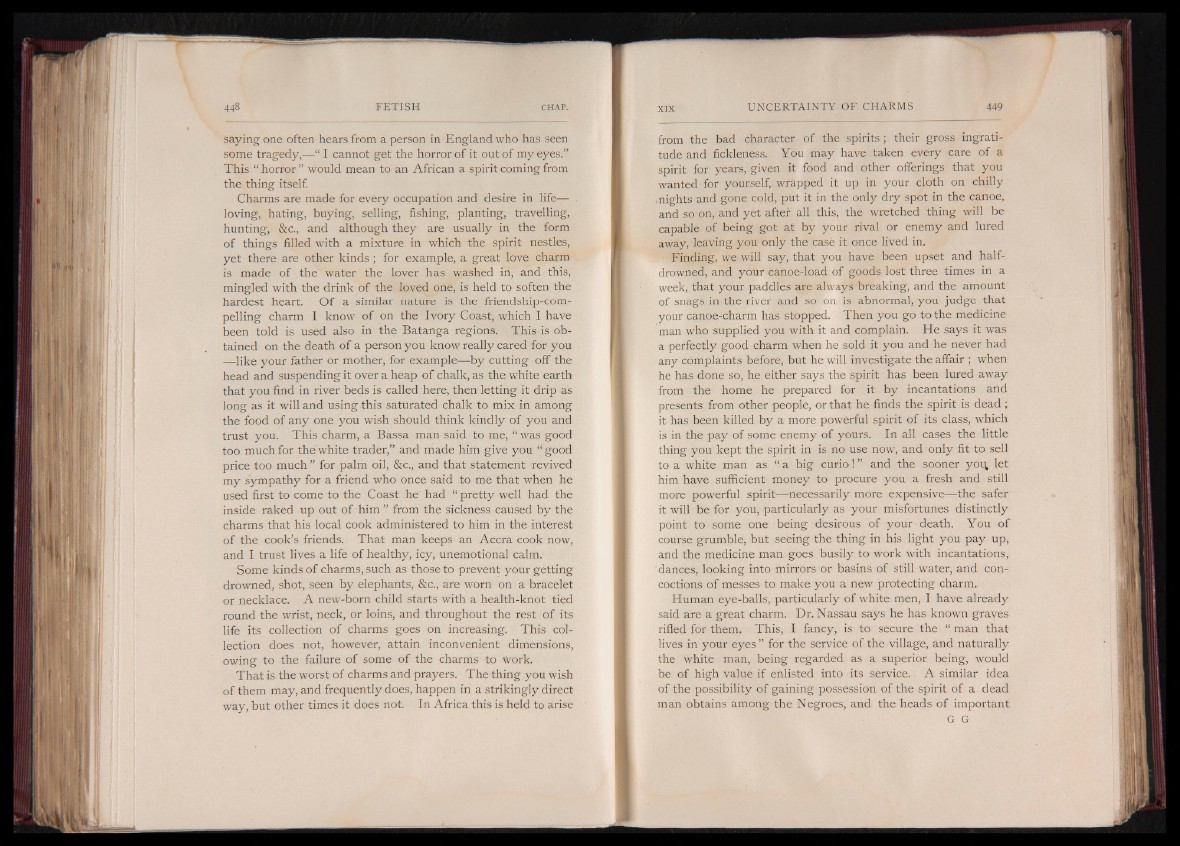
saying one often hears from a person in England who has seen
some tragedy,— “ I cannot get the horror of it out of my eyes.”
This “ horror ” would mean to an African a spirit coming from
the thing itself.
Charms are made for every occupation and desire in l i f e -
loving, hating, buying, selling, fishing, planting, travelling,
hunting, &c., and although they are usually in the form
of things filled with a mixture in which the spirit nestles,
yet there are other kinds ; for example, a great love charm
is made of the water the lover has washed in, and this,
mingled with the drink of the loved one, is held to soften the
hardest heart. Of a similar nature is the friendship-compelling
charm I know of on the Ivory Coast, which I have
been told is used also in the Batanga regions. This is obtained
on the death of a person you know really cared for you
— like your father or mother, for example— by cutting off the
head and suspending it over a heap of chalk, as the white earth
that you find in river beds is called here, then letting it drip as
long as it will and using this saturated chalk to mix in among
the food of any one you wish should think kindly of you and
trust you. This charm, a Bassa man said to me, “ was good
too much for thé white trader,” and made him give you “ good
price too much ” for palm oil, &c., and that statement revived
my sympathy for a friend who once said to me that when he
used first to come to the Coast he had “ pretty well had the
inside raked up out of him ” from the sickness caused by the
charms that his local cook administered to him in the interest
of the cook’s friends. That man keeps an Accra cook now,
and I trust lives a life of healthy, icy, unemotional calm.
Some kinds of charms, such as those to prevent your getting
drowned, shot, seen by elephants, &c., are worn on a bracelet
or necklace. A new-born child starts with a health-knot tied
round the wrist, neck, or loins, and throughout the rest of its
life its collection of charms goes on increasing. This collection
does not, however, attain inconvenient dimensions,
owing to the failure of some of the charms to Work.
That is the worst of charms and prayers. The thing you wish
of them may, and frequently does, happen in a strikingly direct
way, but other times it does not. In Africa this is held to arise
from the bad character of the spirits ; their gross ingratitude
and fickleness. You may have taken every care of a
spirit for years, given it food and other offerings that you
wanted for yourself, wrapped it up in your cloth on chilly
mights and gone cold, put it in the only dry spot in the canoe,
and so on, and yet after all this, the wretched thing will be
capable of being got at by your rival or enemy and lured
away, leaving you only the case it once lived in.
Finding, we will say, that you have been upset and halfdrowned,
and your canoe-load of goods lost three times in a
week, that your paddles are always breaking, and the amount
of snags in the river and so on is abnormal, you judge that
your canoe-charm has stopped. Then you go to the medicine
man who supplied you with it and complain. He says it was
a perfectly good charm when he sold it you and he never had
any complaints before, but he will investigate the affair ; when
he has done so, he either says the spirit has been lured away
from the home he prepared for it by incantations and
presents from other people, or that he finds the spirit is dead ;
it has been killed by a more powerful spirit of its class, which
is in the pay of some enemy of yours. In all cases the little
thing you kept the spirit in is no use now, and only fit to sell
to a white man as “ a big curio! ” and the sooner yoq, let
him have sufficient money to procure you a fresh and still
more powerful spirit|§-necessarily more expensive— the safer
it will be for you, particularly as your misfortunes distinctly
point to some one being desirous of your -death. You of
course grumble, but seeing the thing in his light you pay up,
and the medicine man goes busily to work with incantations,
dances, looking into mirrors or basins of still water, and concoctions
of messes to make you a new protecting charm.
Human eye-balls, particularly of white men, I have already
said are a great charm. Dr. Nassau says he has known graves
rifled for them. This, I fancy, is to secure the “ man that
lives in your eyes ” for the service of the village, and naturally
the white man, being regarded as a superior being, would
be of high value if enlisted into its service. A similar idea
of the possibility of gaining possession of the spirit of a dead
man obtains among the Negroes, and the heads of important